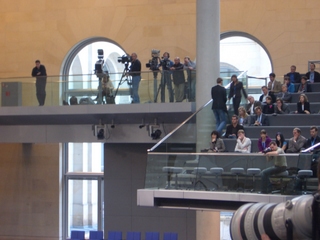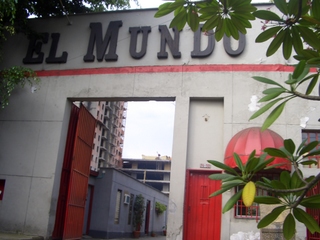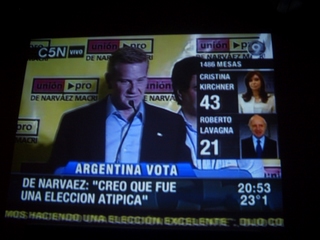Agents of Brands – not of Change
Non-implementation of the Millennium Development Goals (MDGs) is akin to 100 jumbo jets crashing every day and a tsunami hitting a country each week. Every year, ten million children die before they reach the age of five, as 800 million people suffer from hunger. Poverty claims more victims than war does.
Actually this is enough diet for the media, which is ever-hungry for sensationalism, to get attracted towards MDGs. Still, it is not, and in all probabilities it would not. After all, the sufferers due to non-implementation of MDGs are not real air travelers. They are poor people, most of whom cannot afford the cost of consuming media and definitely not potential customers of fancy products, displayed in advertisements on print pages or TV screens. So, why should media bother for such people who are in no way going to contribute in any way to their revenue? May be a story/article here or there can be published or telecast just as a fashion or for the sake of a point to show that we too care for poor. But not a sustain campaign.
The media seem to have lost their way. They have not only forgotten their social agenda but have also lost their very purpose due to the rampant commercialisation of the media ‘business’. With this ‘poverty of purpose’ within media, how can anyone expect this profession to help in eradicating poverty worldwide or to run a sustain campaign for fulfillment of MDGs in a given time span? Modern journalism is very much sensitive to deadlines. Unfortunately, it is also much more insensitive to social agenda and lacks the right purpose.
Fault lies with all in the process – media managers, content developers and the message receivers. As James Fallows narrates his American experience of media in the preface to his book “Breaking the News”, the controls of the media are no more with the professionals or technocrats (in this case real professional journalists). They are with managers (finance and marketing people). In modern days (during the last few years) they call the shots and not journalists and editors as the entire profession (or mission) is turned into business of readership, market share and profit.
Some time back, a few senior editors from India expressed concern over this trend in their respective articles with, of course, reference to India. “Editors in India are an endangered species,” said Vinod Mehta, editor of the newsweekly ‘Outlook’. Another legendary senior editor, Khushwant Singh, expressed similar sentiments, “the hard truth about Indian journalism is that proprietors matter, editors do not; money counts, talent does not.” Rahul Singh, another senior Indian journalist, aptly summarised the situation, “The marketing departments, not editorial, run the show, often making editorial appointments and deciding how the front page should look and what it should display. The Indian newspapers have become brands and products, not agents of change and enlightenment.” Though all the three editors referred to the situation in India, I think it is one and the same, with a little variation, elsewhere too.
Monarchs, political dictators, uniformed heads of state, military junta and similar entities are generally considered to be anathema to independence and freedom in general, and independent media in particular. But the real threat to media freedom, post globalisation, is from private enterprises and corporations willing — and capable — to spend billions on advertising, rather than from political systems and personalities running the country. Market share, advertising revenue and political self-interest drive corporate media agenda. As a result, the society has started to lose the diversity of political viewpoints that are important for democracy and freedom. On one hand, the media is growing and expanding rapidly. But the growth is not translating into improved content standards and empowering the lowest strata of people. In fact, fierce competition is scaling down the level of content to the bottom.
CEOs and boards, along with media managements and to some extent journalists, are willing to surrender their freedom for revenue. Journalists and content developers are forgetting their traditionally established role in the society. They often lack in study, deep understanding, research, analytical skills, hard work and more than all that the sympathy for ‘have-nots’ and an urge to provide them voice. It is really worth doing a survey to find out how many journalists know about MDGs. The content persons or journalists too appear to have lost touch with the people’s real issues. From the third angle, knowingly or unknowingly, the message recipients are adding to worsen the situation by their viewing and reading habits.
It is really worth finding out how many people are interested in reading or watching real issues the people are facing. Even the so called strong media critics, lambasting the media for its deeds, are in the privacy of their homes often found to be interested in watching or reading the trash that media churns out. When a group of educated, urban middle class people were asked to honestly respond as to which programme they would watch-wedding report of two stars or reportage on suicide of poor farmers, they accepted that they would prefer the celebrity wedding report.
This situation brings us to an important point of media literacy. The people are bombarded 24 hours with well carved out, well planned, well thought of, well loaded messages giving information, analyzing issues, selling products. The question is as recipients are we equipped to decode them properly and understand the games media people play? Has anyone taught us to receive and understand the messages in a proper sense? Unfortunately not much effort has been made in that direction for a long time when media was growing to become a monster. Though late, it is needed to be done now as ultimately the business minded media is going to play to the gallery. If people stop receiving trash using a remote in their hand, the source will stop giving the trash. The media is very clever. The moment they know that people’s taste is changing, they change themselves. We witnessed it in Bollywood movies during the last few years.
While working on a large scale for making masses media literate, it is essential to launch a campaign for literacy in media. People working in the media too are needed to be educated about media’s role in a society, social agenda of media, the real issues people are facing, problems of marginalized and downtrodden, MDGs, our recent social history and heritage and issues like human rights, water and gender and more than all the freedom and independence of media. It is also necessary to help them to re-establish their contact with the people.
So, it has to be two-way process of literacy – for content people within media and for large number of readers and viewers. This may lead us to independent media looking into social issues, running sustained campaigns for development, poverty eradication, promoting health issues for poor. The media literacy will create demand for proper messages from outside and literacy in the media will create mature, well equipped, strong and independent media. For independent media, we must remember and emphasise the editor’s role, the purpose of journalism and the function of news. In this context, I cannot resist once again quoting ‘Outlook’ editor Vinod Mehta. He wrote in his piece, “Editors are employed to lead readers, not to be led by them. Really great journalism must do more than merely give people what they want. Brand managers, with honourable exceptions, are congenitally incapable of understanding the nature and purpose of journalism in a free society. They can never understand that content also has a social dimension.”
Milind Kokje
Coordinator of the Asia Media Forum
Next Blog by:
Ricardo Uceda, executive Director of IPYS, Lima/Peru (Instituto De Prensa Y Sociedad), investigative journalist, who formerly directed the newsweekly “Si”, and ran the investigative unit of the daily newspaper “El Comercio“, winner of various prizes, among others the International Press Freedom Award of the Committee to Protect Journalists.










